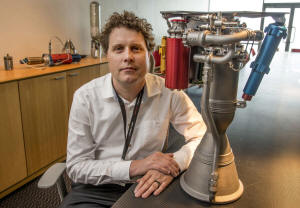Rocket Lab to fire up first tests of new engine next year - CEO
 Send a link to a friend
Send a link to a friend
 [October 03, 2022]
By Joey Roulette [October 03, 2022]
By Joey Roulette
LONG BEACH, Calif. (Reuters) - Launch
company Rocket Lab by next year plans to conduct initial hot-fire tests
of a new, more powerful engine that will power its next-generation
Neutron rocket, the company's chief executive told Reuters.
The Long Beach, California-based company routinely launches small
satellites into space with its small workhorse Electron rocket. In
December, it unveiled a bigger, reusable Neutron rocket, upping its
competitive footing with larger vehicles from Elon Musk's SpaceX and
United Launch Alliance, a joint venture of Boeing Co and Lockheed Martin
Corp.
"We'll start to see tanks roll out of the factory by the end of this
year," Rocket Lab USA Inc Chief Executive Peter Beck said in an
interview on Wednesday, referring to the first carbon composite molds of
Neutron's booster stages.
"We've got preburner tests planned very shortly, then get into full
scale hot fires next year," he said of Neutron's liquid oxygen- and
methane-fueled engines, named Archimedes.
A handful of small rocket-launching companies like Rocket Lab are
pivoting to larger rockets as customer demand trends toward launching
many satellites at once instead of individual satellites on small,
dedicated launch vehicles.

Rocket Lab aims to fly Neutron for the first time in 2024. Beck said
engineers are focused on development and declined to discuss specifics
on customer interest.
But he noted that a number of large satellite constellations, such as
Amazon's Project Kuiper, are expected to be ready for orbital deployment
around that time. He said Neutron would be a suitable vehicle for
launching those types of satellites.
[to top of second column]
|

Rocket Lab CEO Peter Beck sits alongside
a Rutherford rocket engine in Auckland, October 20 2015.
REUTERS/Nigel Marple/File Photo

"Naturally there's a tremendous amount of interest in the vehicle,"
he said.
Rocket Lab went public through a merger with a special-purpose
acquisition company, or SPAC, in August 2021, unlocking $777 million
in gross cash proceeds. Of that total, $250 million has been devoted
to Neutron development, Beck said.
The rest of those funds enabled key acquisitions that have made up
Rocket Lab's space systems business, which accounted for 66 percent
of second-quarter revenue this year.
At the Long Beach headquarters, Rocket Lab completed construction of
a shiny new 10,000 square-foot (930 square- meter) satellite
manufacturing facility, primarily to build 17 satellite busses for
Globalstar Inc's next-generation constellation. Apple Inc will
leverage that satellite network to enhance satellite connectivity
directly to iPhones, an ambitious plan announced this month.
Rocket Lab also is pressing ahead with lans to turn Electron into a
partially reusable rocket to cut costs. Before year's end, Beck
said, it aims to make a second attempt at catching a falling
Electron first-stage booster out of the sky with a helicopter.
(Reporting by Joey Roulette; editing by Jonathan Oatis)
[© 2022 Thomson Reuters. All rights
reserved.]
This material may not be published,
broadcast, rewritten or redistributed.
Thompson Reuters is solely responsible for this content.
 |